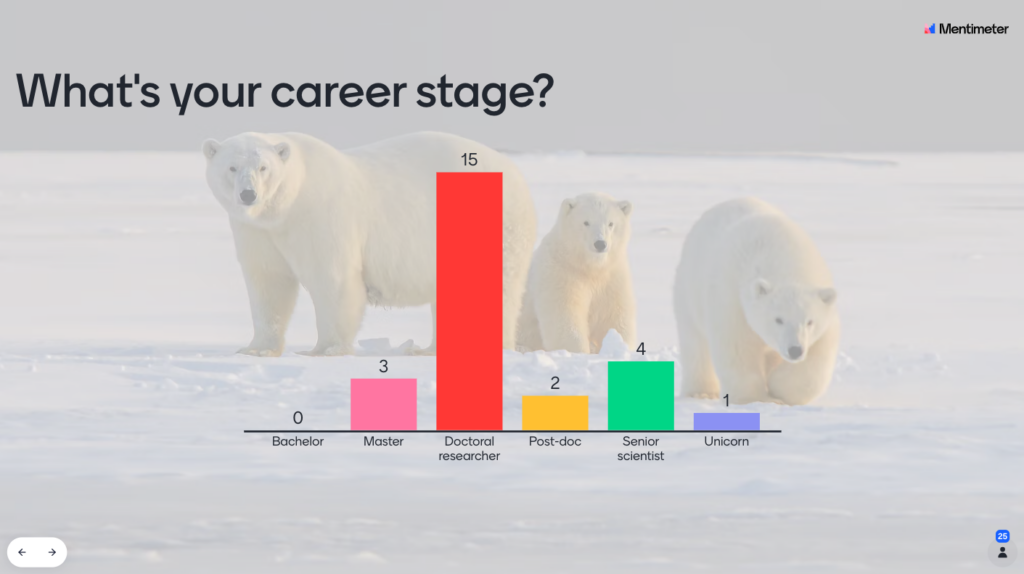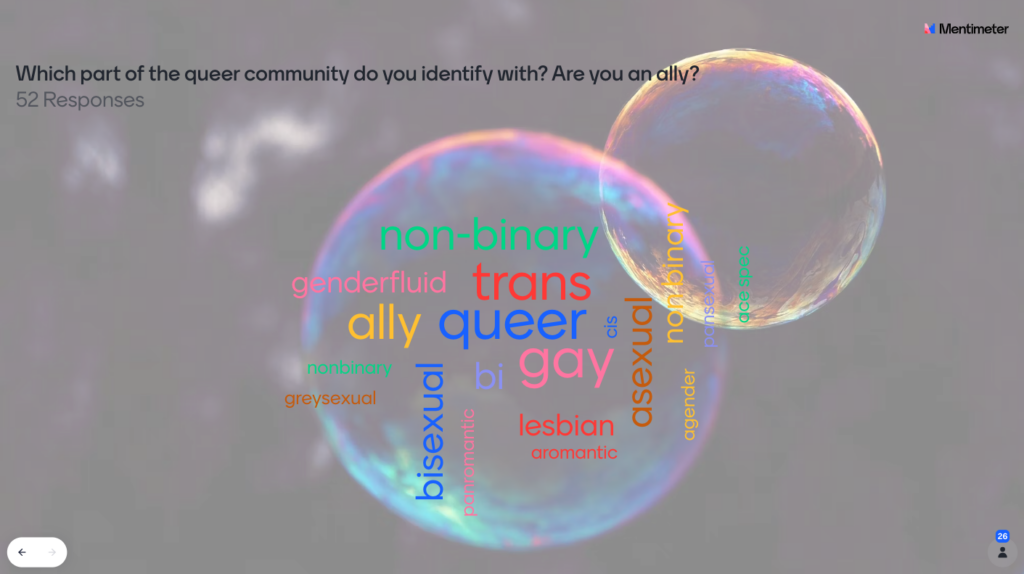Our latest “Let’s talk” seminar was held on the 24th of May offering a place for early career academics to discuss and learn about the stakes and challenges of being queer in polar sciences. The event was open for everyone and more than 30 participants from diverse profiles, as shown in the survey below, joined us.


For the panel, APECS Germany board member Marek Muchow (Aalto University, Finland) was joined by Robyn Verrinder (University of Cape Town, South Africa), Iliusi D. Vega del Valle (Potsdam Institute for Climate Impact Research Potsdam, Germany), Dani Jones (British Antarctic Survey, UK) and Jonas Hagenberg (Max Planck Institute of Psychiatry, Germany and MPQueer steering committee member). From early career to senior researcher, including involvement in different EDI (Equity, Diversity, Inclusion) organizations, our panelists were able to bring answers to several questions from fieldwork to workplace culture and intersectionality raised by our moderator Moritz Zeisig (AWI Bremerhaven, Germany) and the engaged audience in the chat. While we cannot summarize all answers here, we want to bring attention to resources shared during the event and group some answers and thoughts shared below. A list of the resources is also available at the bottom of the summary.
Being visible and joining a community for queer scientists
It can be stressful the first time you have to decide how much you feel comfortable sharing with your co-workers. Being open with co-workers can give opportunities to bond with other queer people and ensure safety due to knowing allies.
The necessity for community and visibility was mentioned during several questions and answers, while it was also acknowledged that this is not possible for everyone. Panelists as well as participants also highlighted the imbalance existing as some countries are more safe than others for queer scientists; and being out, and being an activist for queer rights, highly depends on the level of psychological and physical safety that can be insured in different institutions and states people live in or are affiliated with.
One issue discussed was that there seems to be a bigger variety in support or networking groups for queer students than for queer scientists on the university-level, which could provide helpful information for queer scientists moving to a new country. If you are part of a Max-Planck Institute in Germany you might want to get in touch with MPQueer [1]. Not affiliated to an institute or national-level are EGU Pride, who host a discord server (go here [2] to join), or Pride in Polar Research [3]. If you are interested in building or developing your own queer (online) network, we can also recommend you to watch this EGU Webinar [4] by EGU Pride.
Creating welcoming work environment in academia
The seminar was always also intended as a resource or “learning place” to allies within academia. Throughout the seminar there were several topics shared on which allies can educate themselves, help or act themselves in creating a welcoming work environment.
An overview [5] on “supporting our trans and gender diverse colleagues” written by our panelist Dani Jones features not only great tips on how to be an ally but also a list of openly trans and gender diverse people in Earth Science. Another good resource providing an overview of the state of workplaces for LGBT+ physical scientist (in the UK) is the report “Exploring the workplace for LGBT+ physical scientists” [6], which does not only highlight problems but offers insight into how to solve these issues.
Changing your name can not only be an exciting but also exhausting personal experience for trans academics, but it also has the chance of impacting your career. Currently some journals have already “name change policies”, for example the EGU Journals under Copernicus (policy here). Do you know how journals frequently used in your field of research handle name changes? If they do not have implemented policies maybe consider forwarding working policies.
Participating in fieldwork as a queer researcher
Being out early allows necessary help to be given ahead of the fieldwork period and ensures that, for example, your chief scientist knows of possible needs.
While not every person contributing to polar research participates in fieldwork, fieldwork is one integral part of polar research. Creating fieldwork opportunities for everyone equally should therefore always be a goal in polar science. Mentioned concerns or problems were for example forms during the preparation, which required binary statements, traveling to other countries for the first time, and ensuring continuation of hormone replacement therapies.
We recommend everyone who organizes sea-going research to read “Navigating Gender at Sea” by Kay McMonigal et al. [8] (pre-print). Additionally there is “Best practices for LGBTQ+ inclusion during ecological fieldwork: Considering safety, cis/heteronormativity, and structural barriers” by Jaime J. Coon and Nathan B. Alexander et al. (2022) [9]
Codes of conduct
Conflict happens, there’s nowhere where people working with other people will have zero conflict ever. Our goal is to make sure there is open communication to try to resolve issues instead of letting them fester.
Codes of conduct are particularly relevant in the office, during fieldwork, and for gathering events such as seminars and conferences. While all codes of conducts should include clear anti-discrimination statements, they can also be extended and provide resources (e.g. how to communicate in an inclusive way at the workplace (e.g. replace “home country” with “country of origin”, how to use pronouns, …). APECS proposes a field code of conduct [10] that can be used as a base for your own.
During the seminar, panelists and audience shared what they think makes a code of conduct usable and with that successful. It needs to be clear, who to contact and how to report misconduct. Additionally, it should mention the sanctions that will be applied in case of non-respect of the code of conduct. Furthermore, PIs and team leaders should ensure that codes of conduct have been read, understood and signed by all newcomers in a team, and prior to going on the field in case of fieldwork.
Additionally, people in the audience shared good experiences with code of conducts, which were regularly worked with, where codes of conduct got (re-)written and adapted by members of a team, allowing it to evolve with time and situations. Reviewing a code of conduct and how well the reporting system works was shared as an important tool to keep the code of conduct present within an institution.
Intersectionality
The inclusion of queer and LGBTI+ people in polar sciences leads to a work environment not only appropriate to all people identifying as such, but also adapted to all who do not correspond to the archetype of the polar adventurer of all times (white, male, and able-bodied). Tailoring experiences for queer, non-male, BIPOC, disabled, neuroatypical people, for people who bear caring responsibilities and, in fine, to allow a plurality of unique profiles to contribute to polar research, leads to the improvement of our work environment and science for everyone [11].
We thank our panelists and the engaged audience for having the time to share their experience with us! Thanks as well to our organizing team with various tasks including Moritz Zeising, Rey Mourot (GFZ Potsdam, Germany) and Marek Muchow.
Resources
Here we list all resources mentioned in the text above. Most of these resources were shared during the seminar – if you have additions to the list feel free to contact us as we might rework this into one of our resource pages. The numbers indicate the order of the resources in the text. You can also find additional polar or academia-related EDI resources on the APECS International website.
Queer networks and groups
[1] MPQueer Infopage
[2] EGU Pride sign-up form
[3] Pride in Polar Research twitter account
Fieldwork
[8] Kay McMonigal, Natalya Evans, Daniel C Jones, et al. Navigating gender at sea. ESS Open Archive. March 26, 2023. DOI: 10.22541/essoar.167979164.49797676/v1
[9] Coon, Jaime Jo, et al. “Best practices for LGBTQ+ inclusion during ecological fieldwork: Considering safety, cis/heteronormativity, and structural barriers.” (2023). doi: 10.1111/1365-2664.14339
[10] Field code of conduct by APECS International
[4] EGU Webinar “How to build an LGBT+ network in geoscience” with EGU Pride
[5] Blogpost “Supporting our Trans and Gender Diverse Colleagues” written by Dani Jones, Britisch Antarctic Survey, March 2023
[6] Report: “Exploring the workplace for LGBT+ physical scientists”, Institute of Physics, Royal Astronomical Society and Royal Society of Chemistry (2019), PDF
[7] “Inclusive author name-change policy” by EGU and Copernicus (Policy) published with the Announcement in June 2022
[11] Nature editorial “Science benefits from diversity”, Nature 558, 5 (2018).